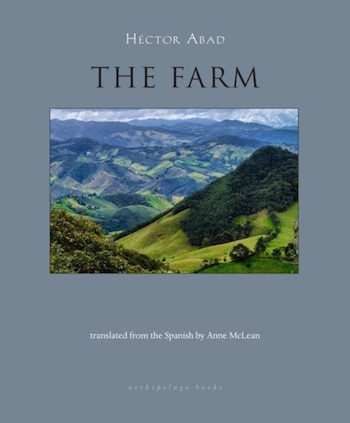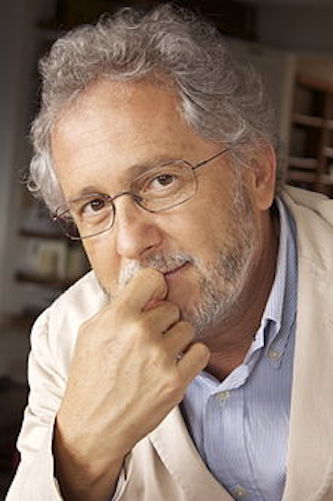Book Review: “The Farm” — Obsessed With The Land
There can be no future, Héctor Abad seems to be arguing, when everything you are is hidden away in a time you can never fully know.
The Farm by Héctor Abad. Translated from Spanish by Anne McLean. Archipelago Books, 468 pages, $16.
By Lucas Spiro

Whatever your opinions of the Netflix series Narcos, the first episode begins with an inter-title useful for a discussion about Colombian writer Héctor Abad’s latest novel The Farm. Narcos quotes Matthew Stretcher’s definition of magical realism, the literary genre commonly associated with Gabriel García Márquez and other giants of 20th century Latin American literature: “Magical realism is defined as what happens when a highly detailed, realistic setting is invaded by something too strange to believe.” After a beat, the writers of the show add an editorial remark: “There is a reason magical realism was born in Colombia.”
Magical realism may not have been invented in Colombia, but some critics have called The Farm Colombia’s twenty-first century rejoinder to One Hundred Years of Solitude. There are many similarities. Both novels are multi-generational stories that focus on Colombian families with strong roots in a particular location, draw on supernatural elements, and examine Colombian history. The Farm is a far more personal journey; the novel has been seen by some as Abad’s stylistic and narrative response his memoir Oblivion. The novel is also part of a quest genre in which the artist returns to familiar terrain, searching to find answers to troubling quandaries from different perspectives. In contrast to Marquez’s tome, the reality of the past in The Farm is no longer something “too strange to believe” — it must be confronted again.
The image and reality of Colombia is changing, and so its literature is changing with it. Colombia is shaking off its reputation as an incalculably violent narco-state that is surrounded by unparalleled natural beauty. All that violence doesn’t disappear, of course. Trauma stays with a country, as with a person. Most of our histories and laws are written in blood; we must account for that blood. Abad attempts to dramatize that history through the prism of a single family and their perfervid devotion to a piece of land.
The Farm is about the Ángel clan from Medellín, in the Antioquia region of Colombia, and their isolated family farm in the mountains, La Oculta, which means “the hidden place.” The narrative is told through the perspectives of three narrators, the trio of siblings who come together after their mother’s death. They must decide what to do with the farm. Antonio, the only son and youngest, is a violinist who lives in Harlem with his husband Jon. Eva is a rather liberal woman, three times divorced, and with a string of other boyfriends behind her. She is also brilliant, but her ambitions were permanently delayed because she stayed to work in her mother’s bakery, a decision that was made for her. Pilar, the oldest, is the most traditional. She is married to her high school sweetheart and lives much of her life on the farm.
What Abad captures so well in this novel is just how much is hidden from those with whom we share the most in common. Three narrators grapple with the same issues — the farm, family members, the destiny of genes and history — in a realistic narrative structure in which they each remember the same events differently. Their deepest connection is through the family’s piece of land — and even that is a site of conflict.

Author Hector Abad. Photo: Wiki Commons.
The farm is also a site of attack. For Eva, a gang of narcos attempted to murder her, forcing her to escape the farm and make a tense return back to the city. She has decided to sell the land after their mother’s death; she wants nothing to do with the place that nearly killed her. She never fully recovered from the trauma. Eva used to believe that at La Oculta “nothing could happen to” her. Outside of the farm and the family “everything was unprotected, dangerous, and risky, but on the farm [she] felt safe and sure, as if [she] were inside an impregnable fortress.” When that illusion of safety is shattered it nearly destroys her, until she ends up in what might be her first fulfilling relationship with a woman named Posadita. The name means “little inn,” and carries Catholic connotations of Mary and Joseph’s search for a place of lodging in Bethlehem.
Pilar is steadfast, ritualistic, and religious. She dresses the family’s dead; in fact, she has “an intimate and affectionate relationship with the dead,” approaching the unsettling but ritual task with a preternatual calm. In her brother Antonio’s estimation “Pilar doesn’t get intimidated by any difficulty… Nothing disgusts her, nothing embarrasses her, nothing frightens her.” She keeps her imperturbability, even after guerillas kidnap her son, Lucas, and hold him for ransom. It is a horrific event that she believes killed her father, Jacobo, whose “heart burst from so much suffering over Lucas.” Still, Pilar believes that, in some way, she will get her son back.
Antonio is perhaps the most conflicted about his homeland. He has adapted to and embraced his life in New York, living through the hedonistic ’80s and then settling down. It was difficult for him to grow up gay in Colombia, where even his liberal-minded father wanted him to be more machito. Still, Antonio loves La Oculta above all else — he thinks of it as his only true home. Antonio is obsessed with the history of the founding of his home, the nearby town Jericó, and his family’s expedition to settle in the mountains. He has researched back over 150 years and can trace almost every member of the family, who are descended from Spanish Jews who left Europe with New World dreams. The creation of the town is a modest but inspiring story, built on the egalitarian ideals in which a society of free people own their own land and where no one is better than anyone else:
Jericó didn’t begin with conquistadors or monks, but with simple people, and if not equals, at least very similar in their attire and way of talking. La Oculta was an insignificant portion of an immense extension of lands the Republic handed over in repayment of legitimate debts incurred with two merchants… neither of whom had a noble hair on their heads.
Of course, we know how things turned out. Antonio brushes over the suffering of the indigenous people in his version of history. He provides an superficial excuse for his ancestors, arguing that indigenous people were welcome in the new settlement. That doesn’t mean much to those who were killed or displaced in order for it to be established.
Abad’s memoir Oblivion was a nostalgic and painful meditation on the life of the family patriarch, who was murdered by paramilitaries. In The Farm he passes some of that nostalgia — that return to an agonizing place — off onto these siblings. All of them look at the same object, the hidden place, trying to give it a comforting shape and meaning. But a final reconciliation is impossible for this family, who seems to suffer from a “finca madness,” an obsession with land. They can’t accept the past and then create the future, haunted, as they are, by “the injustices of destiny.”
There can be no future, Abad seems to be arguing, when everything you are is hidden away in a time you can never fully know. Antonio’s understanding of history is partial, a tragically incomplete narrative. “I have a good memory,” Pilar insists. She is not like her brother, who “doesn’t remember anything, so he makes it all up.” Eva finds a revealing passage of her father’s writing: “Literature should go back to the style of the Bible or Homer: action, suspense images, and just a pinch of mind games.”
Abad attempts this ambitious form in The Farm. On the one hand, he is grappling with the accomplishments of his literary forebears, who gave partial (and often exculpatory) visions of Colombian history. On the other, he is looking for a fresh way to confront the horrors of his country’s past. He is trying to create an imaginative space in which something “too strange to believe,” history’s corrosive reality, can be confronted, somehow given a shape that makes sense.
Lucas Spiro is a writer living outside Boston. He studied Irish literature at Trinity College Dublin and his fiction has appeared in the Watermark. Generally, he despairs. Occassionally, he is joyous.
